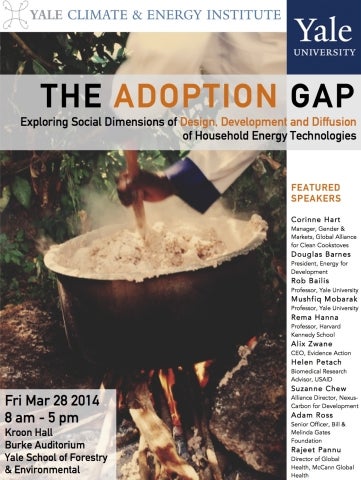Note: Yale School of the Environment (YSE) was formerly known as the Yale School of Forestry & Environmental Studies (F&ES). News articles and events posted prior to July 1, 2020 refer to the School's name at that time.

During a global forum in Phnom Penh last year, where leaders convened to talked about the state of cookstove technology, Jasmine Hyman heard about some encouraging trends.
Experts described promising new technologies that could help poor people worldwide move away from burning solid fuels for cooking and heating, a common practice that has profound health and climate impacts. And there were discussions of the financial models that might help promote distribution of these cleaner stoves.
But there was little talk about the social aspects of the stove, says Hyman, a doctoral student at F&ES. And without large-scale adoption of these technologies — and a better understanding of why some households and communities don’t shift to cleaner technologies — the Global Alliance for Clean Cookstoves will never reach its goal of achieving 100 million cleaner stoves by 2020, she says.
So, along with F&ES Professor Rob Bailis, she decided to help organize a separate conference, “The Adoption Gap: Exploring Social Dimensions of Design, Development and Diffusion of Household Energy Technologies,” which will be held at F&ES on Friday, March 28.
“I became intrigued by the possibility of holding a conference that looked squarely at the social aspect of adoption,” Hyman said. “One that sets aside, at least momentarily, the extremely important issues of public health, stove design and financing given that these issues are so commonly examined.”
The event — which will be held in Kroon Hall — is sponsored by the Yale Climate & Energy Institute. The conference can also be viewed online via livestream.
According to the event’s organizers, more than 3 million people worldwide still rely on inefficient devices for their household cooking and heating. The household air pollution created by this burning is the fourth-biggest cause of illness and death worldwide.
In a series of panel discussions, experts — including stove developers, policymakers, academics, and representatives from NGOs — will discuss the elements that affect cookstove adoption in high-risk communities, opportunities for more effective dissemination, and possible lessons from other technology sectors.
“My greatest hope is to leave the day with more clarity on the factors that matter for adoption and for the cookstove community to understand the need to incorporate those factors into our discussions, conferences, papers, research, and programs,” Hyman said.
Experts described promising new technologies that could help poor people worldwide move away from burning solid fuels for cooking and heating, a common practice that has profound health and climate impacts. And there were discussions of the financial models that might help promote distribution of these cleaner stoves.
But there was little talk about the social aspects of the stove, says Hyman, a doctoral student at F&ES. And without large-scale adoption of these technologies — and a better understanding of why some households and communities don’t shift to cleaner technologies — the Global Alliance for Clean Cookstoves will never reach its goal of achieving 100 million cleaner stoves by 2020, she says.
So, along with F&ES Professor Rob Bailis, she decided to help organize a separate conference, “The Adoption Gap: Exploring Social Dimensions of Design, Development and Diffusion of Household Energy Technologies,” which will be held at F&ES on Friday, March 28.
“I became intrigued by the possibility of holding a conference that looked squarely at the social aspect of adoption,” Hyman said. “One that sets aside, at least momentarily, the extremely important issues of public health, stove design and financing given that these issues are so commonly examined.”
The event — which will be held in Kroon Hall — is sponsored by the Yale Climate & Energy Institute. The conference can also be viewed online via livestream.
According to the event’s organizers, more than 3 million people worldwide still rely on inefficient devices for their household cooking and heating. The household air pollution created by this burning is the fourth-biggest cause of illness and death worldwide.
In a series of panel discussions, experts — including stove developers, policymakers, academics, and representatives from NGOs — will discuss the elements that affect cookstove adoption in high-risk communities, opportunities for more effective dissemination, and possible lessons from other technology sectors.
“My greatest hope is to leave the day with more clarity on the factors that matter for adoption and for the cookstove community to understand the need to incorporate those factors into our discussions, conferences, papers, research, and programs,” Hyman said.
Schedule of Events
8:00 – 9:00 am Registration and Coffee9:00 – 9:50 am Welcome and Opening Remarks
Rob Bailis, Yale School of Forestry & Environmental Studies
Keynote Address by Corinne Hart, Global Alliance for Clean Cookstoves
9:50 – 11:10 am Panel: The Puzzle of Low Adoption for Welfare-Enhancing Technologies (Douglas Barnes, Energy for Development; Mushfiq Mobarak, Yale School of Management; Adam Ross, Bill and Melinda Gates Foundation) Moderator: Yiting Wang, Yale F&ES
11:20 am – 12:40 pm Panel: Lessons from Other Approaches or Sectors (Rajeet Pannu, McCann Global Health; Alix Zwane, Evidence Action; Michael Kremer, Harvard University; Ali Akram, Yale F&ES) Moderator: Mushfiq Mobarak, Yale SOM
12:40 – 1:40 pm Lunch Break
1:40- 3:10 pm Panel: Adoption in Practice (Suzanne Chew, Nexus-Carbon for Development; Helen Petach, USAID Bureau for Global Health; Rema Hanna, Harvard Kennedy School; Ethan Kay, BioLite) Moderator: Jasmine Hyman, Yale F&ES
3:20 – 4:20 pm Wrap Up Session
4:30 – 6 pm Reception
Published
March 25, 2014